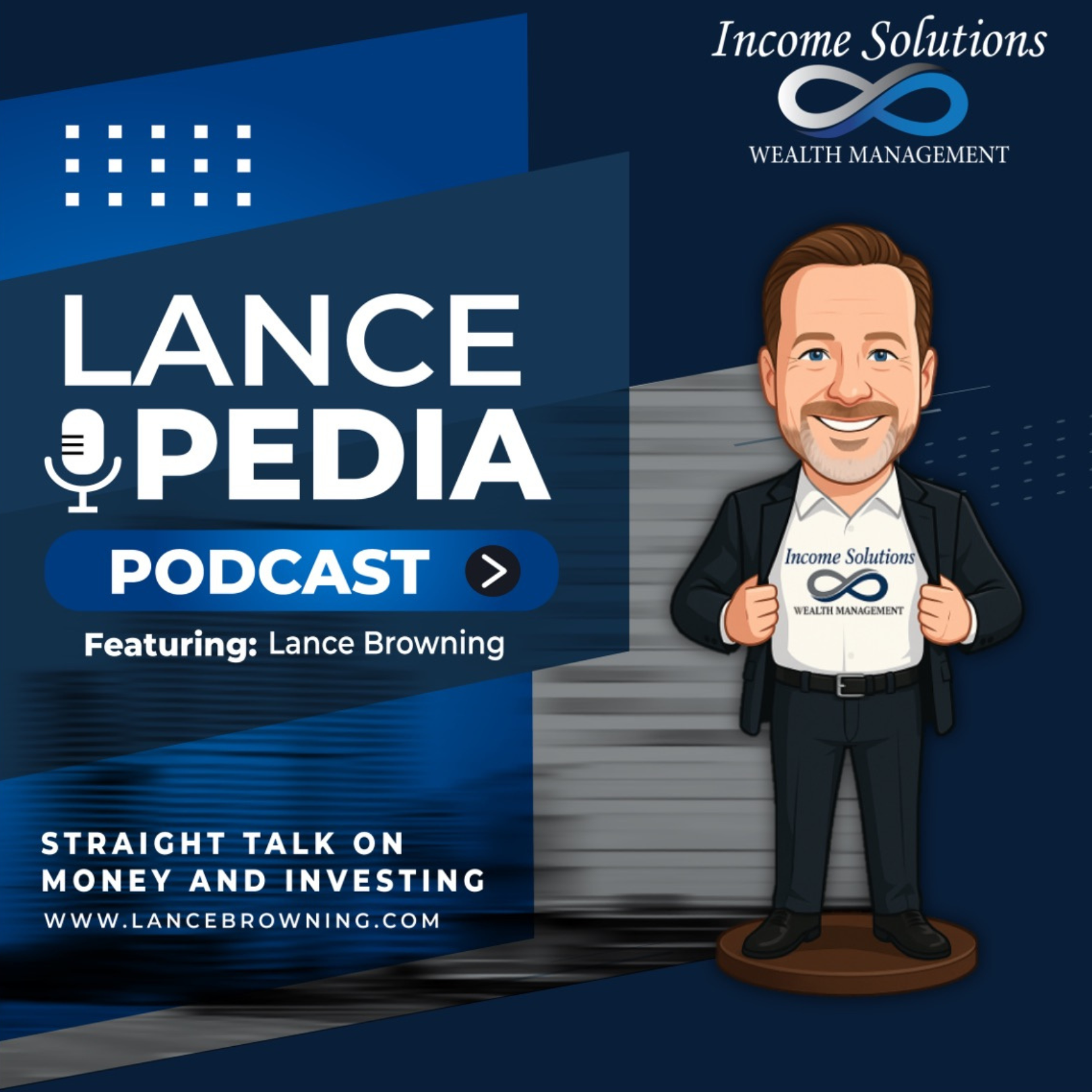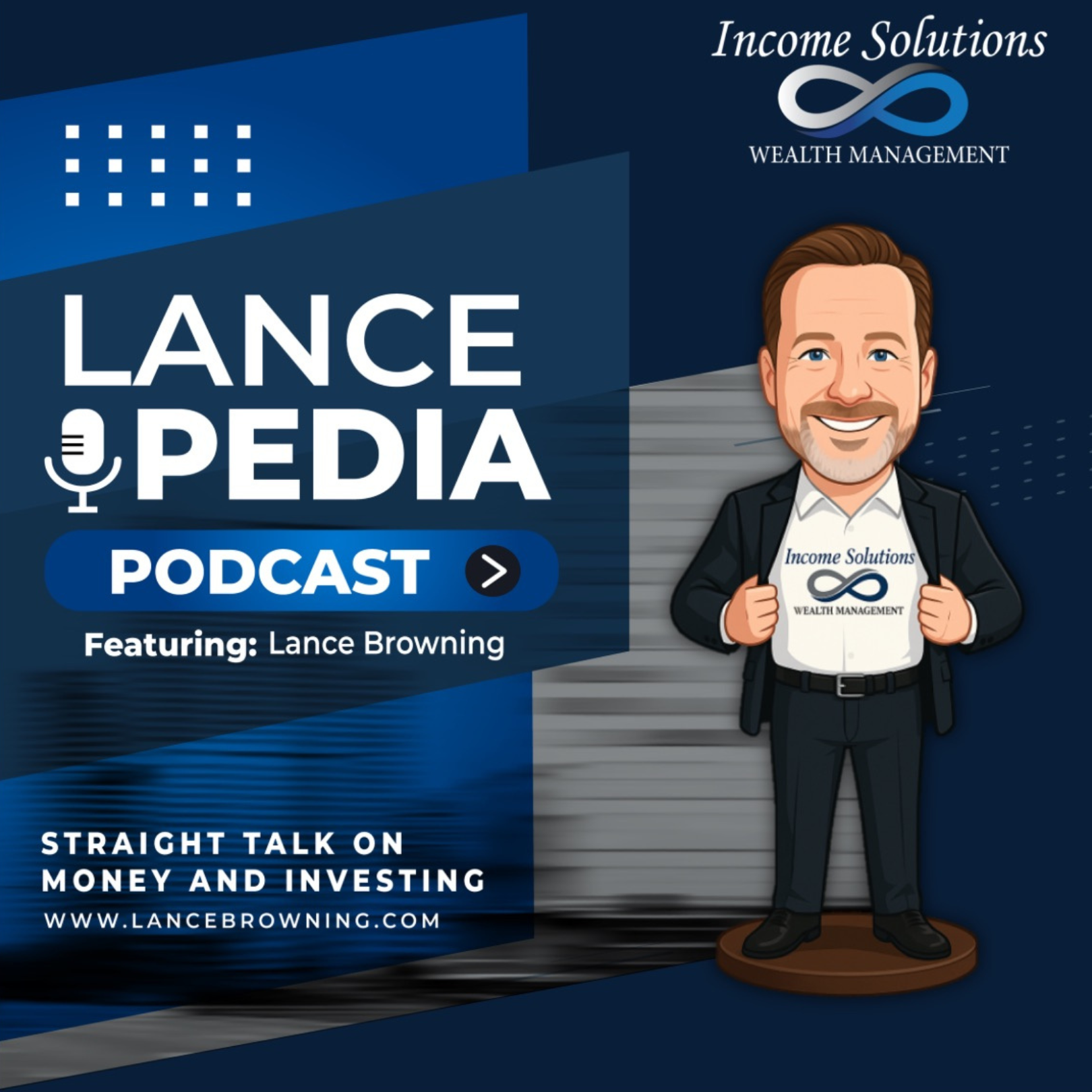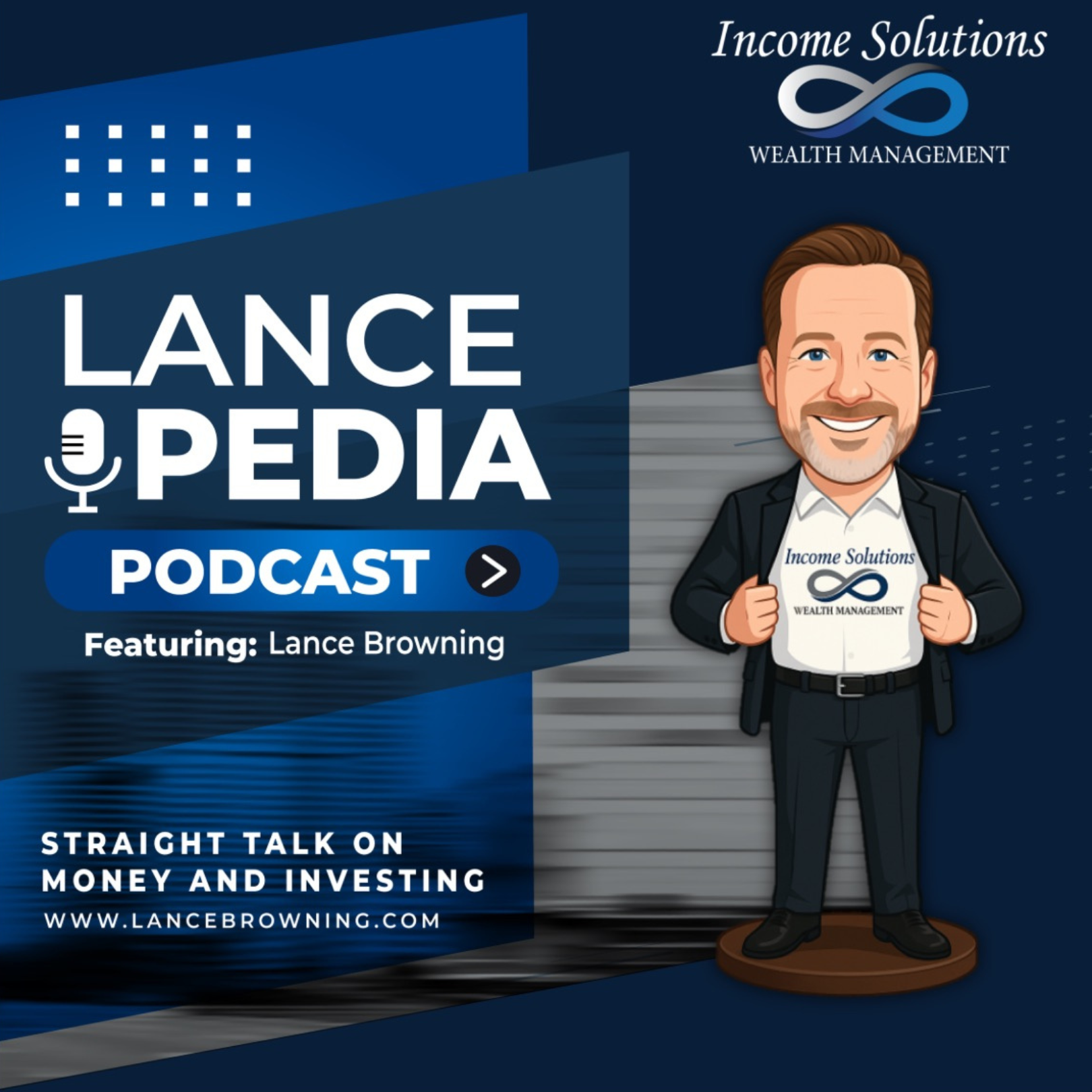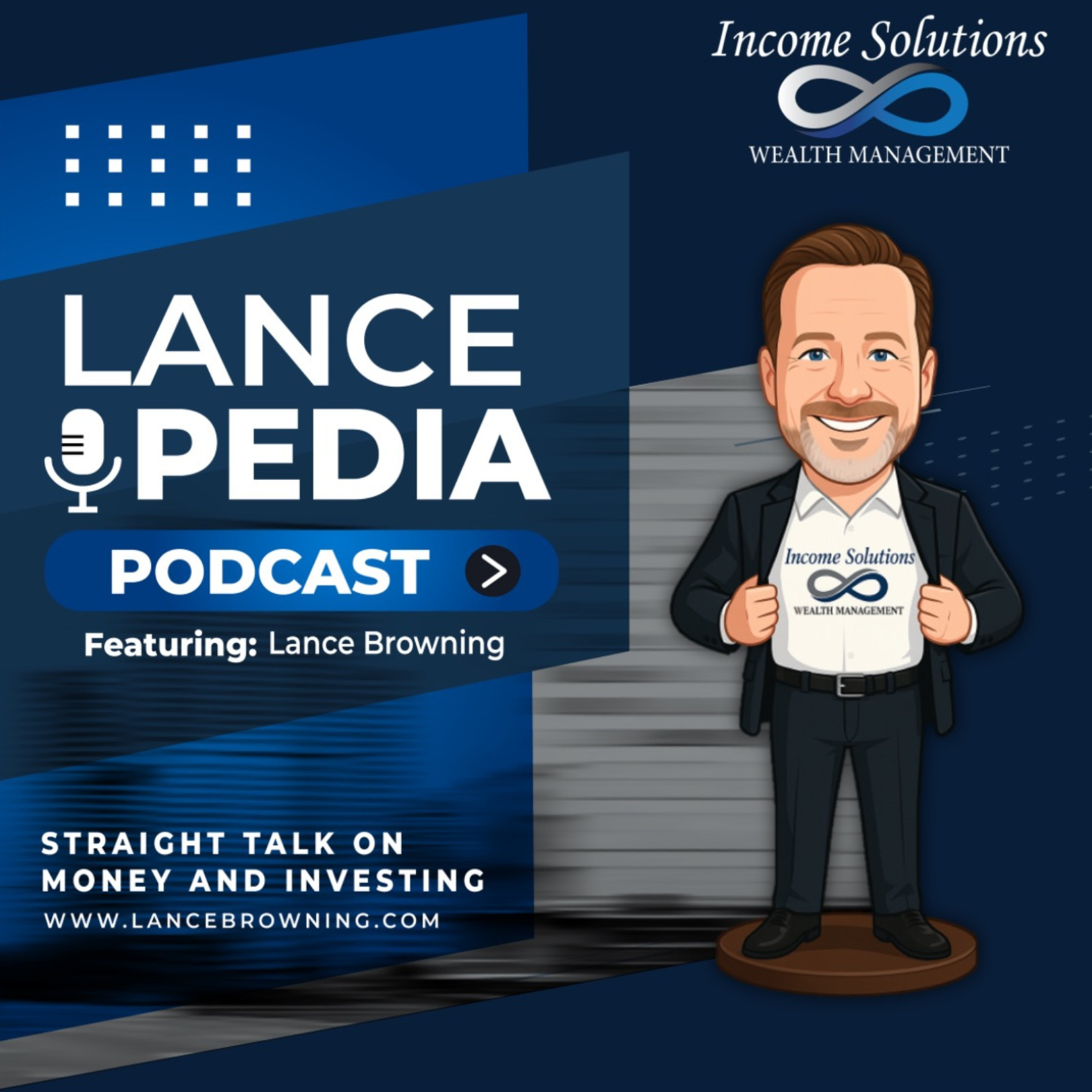Episode Transcript
[00:00:02] Speaker A: The military might of the United States is incomprehensible. It will literally numb the imagination, the power, the capabilities that we have. Maybe a good way to describe our very flawed currency and debt situation is to kind of take a trip down memory lane, go back date ourselves a little bit here. But think back to the very, very heyday of boxing. Great sport, right?
So imagine, Garrett, back in the day that Muhammad Ali owed you a bunch of money. All you gotta do is go collect, right? Good luck with that. Okay.
As Joe Frazier found out the hard way in this.
[00:00:45] Speaker B: Welcome back to episode two of Lancepedia, featuring Lance Browning of Income Solutions Wealth Management in beautiful Tyler, Texas. I'm assuming it's beautiful. Never been to Tyler, Texas, but hot.
[00:00:58] Speaker A: Is what it is.
[00:00:59] Speaker B: It's hot here, actually. We're getting a tiny cool off. I mean, by cool off, I mean it was like only 93 this morning on my walk, you know. So anyway, tis the season to be sweaty, I suppose, but pleasure to be with you again, Lance. Always enjoy your commentary. And we're going to talk about today is the.
We can go with any of the three Ds here. The deterioration of the dollar, the death of the dollar, the decline of the dollar, but whatever. D, my preacher loves to alliterate with the morning bulletin. So I like to put things in the same letter. But no, you've got in whatever flavor you want to put on it, really. Since the 1970s, it's been exponentially more so. Since the late 2008, 2009, it's been exponentially even more so since COVID But man, the dollar isn't what.
That can be a really scary thing for a lot of investors. Heck, it's a scary thing for consumers, for Americans.
But at the same time, you know, there's what one side says, there's what the other side says, and then somewhere in the middle of. That's probably the truth somewhere. So what is going on with the dollar from the viewpoint of Lance Browning?
[00:02:11] Speaker A: Yeah. So, you know, and I've gotten these calls over the years, and I know you did too, when you were practicing, you know, oh, the dollar's gonna be worth it. It's going to zero and all this, that and the other. And a couple.
First of all, no, it's not.
Secondly, currencies typically do not trade independently like a stock does. Okay? Currencies generally trade in relation to one another. So it's the dollar to the euro, the dollar to the yen, dollar to the yuan, dollar to the peso, whatever.
So if we say the Dollar's worthless or gonna be worthless.
I have to ask. So in relation to what exactly is it going to be worthless, too?
And I'm kind of stating the obvious here, but the United States is a mess. We are. Our fiscal situation, national debt, deficits are a train wreck. Okay, Garrett, but here's the thing. So is everybody else.
And if you want to tell me that you're worried about our currency and our debt, etc. Look, I get it. Completely understand. I get it. You're right. But here's my question. What other country's currency would you rather own?
That's the question. And before you go there, gold is not a currency.
All right? Gold is not a currency, Right?
And so the best way I can often describe the US Dollar is that we're the US we're the prettiest dog in the Ugly Dog contest. So, speaking of ugly dogs, this is Wild Thing. Her name's Wild Thing, okay? She was the winner of the 2024 Ugly Dog Contest. So that's actually a thing.
[00:03:53] Speaker B: We actually have an ugliest Dog contest, apparently.
[00:03:55] Speaker A: Yeah, apparently there is. Apparently there is. So they probably do it in North Carolina, I'm sure. But here we.
[00:04:00] Speaker B: Welcome to 2025 Society.
[00:04:02] Speaker A: That's it. That's it. So she probably has a podcast, right? But so here we are. She Wild Thing. She's a symbol of the US Dollar pretty strong in the Ugly Dog contest. Okay, so there was a book out entitled Death of the Dollar, Death of the Dollar, by a man by the name of William F. Rickenbacker. Okay? And so in his book, he describes how our national debt, fiscal mismanagement, decoupling from the gold standard and all these things, how they were going to make the US Dollar not worth the paper it's printed on, literally. Okay?
And as I said a second ago, a lot of people share his concerns. I mean, everything he's saying makes a ton of sense, right?
Here's the thing, though. Gary Rickenbacker's book was published in January of 1969. Okay? That's 56 and a half years ago by my Texas public school math. And this book was put out before a couple of very other very important things in 1969.
So, number one, the booth, the moon landing, the lunar landing in July, and number two, my birth, most importantly, those very important things. Yeah, according to my mom, very important things. But so I'm a 69 model myself, right? So I was born about 10 months after this book came out. And don't look now, but the US Dollar the world and I are all still around, interestingly enough, 56 and a half years later. Rest, as they say, is history, right?
And so here's kind of. I'll share out some things, just give you some bullets on what we disagree of why we disagree so strongly with what Rickenbacker was trying to assert there.
And we strongly disagree, and we do. But at the end of the day, here's why, okay, why we disagree. So give me. There's a lack of a viable currency alternative, okay, from any other country like we just talked about. So you gotta look and you gotta factor in and think about the size and the strength, the sheer scale of the US economy. You got to think about the rule of law here in the United States. You've got to look at the size and the liquidity, the scale, the scope of our capital markets. And then lastly, I think you need to take into consideration the military might of the United States of America. So let's look. Next slide. Garrett, let's look at the dollar slide. You know, look at the currency composition. Okay, so let's look at the currency composition in global foreign exchange reserves. Right? So in. Even though it has declined, granted over the last 25 years, the US dollar is still about 59% of these reserves, almost 60%. Okay, remember that the United States is about 5% of the world's population.
So 59% is more than every other country on earth combined.
The distant second is the euro at 21%.
The Invincible Economic juggernaut that is China, somewhere in this other category at 10% with a bunch of other currencies, with a bunch of other currencies in other countries. Okay, so let's look at the dollar trend. Let's look at transactions globally by currencies. Next slide. So, so let's look at this. So going back 30 plus years, the US dollar is going to be that light blue bar, the big one, the tall one, right?
And so the next four countries that's or currencies is gonna be the euro.
Japan, Great Britain and China are the other countries.
This really gives you the scale here, Garrett. So the largest by miles and miles, the us the smallest global transaction by currency, they're in orange.
China.
You wouldn't think that, but that's what the data is telling us. All right, so next let's look at GDP by the 15 largest countries on earth. Okay, so GDP, we just had a report yesterday on the U.S. gDP is, it's called stands for Gross Domestic Product. That's the bottom line report card on any country's economy.
Bottom line, report card. So the largest, obviously, clearly the good old USA. Second, China.
The US and China make up 67% more than double the other 13 largest countries combined. Okay, Combined. So we're huge. Long story short, we're huge. All right?
And I would say another advantage and differentiation that the United States has is the rule of law.
So we have a constitution that has stood the test of time for over 250 years. Right? 200 years. Excuse me.
We have a duly elected representative democracy.
We have established contract law. We have laws in place to protect private property.
Are these laws perfect? No.
Are the people that write these laws perfect? No.
[00:09:19] Speaker B: Easy.
Don't be harsh on the people who write the laws.
[00:09:23] Speaker A: Absolutely. That's a really big no. But still, the US Again, still, even with all of these issues, we're still the pretty dog. We're still a pretty stalk and ugly dog contest. Our laws are still the best. All right, the U.S. garrett. And you know this. The U.S. has very, very large, very liquid and active securities exchanges, capital markets. So within reason. Okay?
[00:09:46] Speaker B: And these are the. These are the stock markets, the bond markets. It's very. What. What. What that means in the simplest terms is it's very easy to buy and sell stocks and other financial products in the United States compared to some other. Other countries and other economies.
[00:09:58] Speaker A: Just about anything, within reason on any of our exchanges, correct? Yeah. So these are gonna be the 10 largest equities. So this is just equity, by the way. It's just stocks. Okay? When we say equity means stocks. These are the largest 10 equity exchanges in the world. The top two, with almost $54 trillion in them are both in the U.S.
so that's gonna be the New York Stock Exchange and the nasdaq. Okay? No one else is even. You see, in our zip code, China, their two largest exchanges are less than one fifth the size of the two largest in the US So size and scope, size and scale again.
Lastly, we don't talk about the US Military. United States military, okay? Just ask Iran. Right here, you see a list of countries with the highest military expenditures. And note, the US Is more than three times that of China.
The military might of the United States is incomprehensible. It will literally numb the imagination, the power, the capabilities that we have. Are we invincible? Probably not.
But if I ask you, and ask our audience here, who's bigger and better than us?
Right. You know, that's the thing to kind of keep in mind. And we always date ourselves. We always show how old we are when we do These, Garrett. But to kind of further illustrate, our military might show this picture here, Muhammad Ali. So maybe a good way to describe our very flawed currency and debt situation is to kind of take a trip down memory lane, go back date ourselves a little bit here, but think back to the very, very heyday of boxing. Great sport. Right?
So imagine, Garrett, back in the day that Muhammad Ali owed you a bunch of money.
Okay. All you gotta do is go collect.
[00:11:50] Speaker B: Yeah.
[00:11:50] Speaker A: Right. No problem there. Right. Good luck with that. Okay.
As. As Joe Frazier found out the hard way in this, this iconic picture here, that's been a lot easier said than done. You don't want the US Dollar. The US Owes you a bunch of money.
Step in the ring and take your chances. So these are reasons why we think, you know, just the size and scale of the economy, of our laws, of our exchanges, of our securities exchanges and markets, capital markets, and our military.
The dollar's not going anywhere anytime soon.
[00:12:26] Speaker B: Yeah, it was funny, actually. I never.
First of all, I made it through microeconomics just fine. I flunked macroeconomics once, and I really don't know how I made it a in it the second time. I don't think my macroeconomics teacher could actually do math, but.
[00:12:42] Speaker A: Right.
[00:12:43] Speaker B: I've never really claimed to have a strong understanding when it comes to the currency exchanges. It's just too complicated to me, where you've got stocks make sense. I can understand the economics behind that. But when you start talking about comparing currencies, I look at how much money printing is going on in the US and what we're doing to the dollar here in the US and it does seem like it's excessive. But then when you compare it to other parts of the world, it is a relative game. Right. And the way you said in the beginning is spot on.
And it's that something that gets lost a little bit. I've read a couple of books on the subject, and it's really. It's. It absolutely is a relative.
It's a game of relative strength, not absolute strength. Right. And that's the big key to it.
[00:13:28] Speaker A: So.
[00:13:29] Speaker B: Well, Lance, as always, thanks for. For your time. And why don't you tell the viewers, listeners, wherever you're watching and joining this. This wonderful podcast, how you can get in touch with Lance and your team if you're those who are interested in chatting with you further.
[00:13:44] Speaker A: Absolutely. So. Yeah. Thanks, Garrett. So Direct line, office line 9037-8789-1690-3787-8916. You can reach our our website, Lance www.lancebrowning.com www.lancebrowning.com or you can come see us here at Central Command on Troop highway and Tyler Awesome Lance.
[00:14:08] Speaker B: Well look forward to seeing you next time. Always enjoy it and hope you have a great rest of your day, my friend.
[00:14:13] Speaker A: Thanks brother. Appreciate it.
[00:14:14] Speaker B: See you. Bye.
Lancepedia is for entertainment and educational purposes only. The views and opinions expressed in the show are that of Lance Browning and are not guaranteed to come to fruition. If you have questions about your investments or your financial plans, you should seek a financial professional or give Lance a call at 903-787-8916. We thank you again for watching or listening to the podcast and we'll see you next time.
[00:14:35] Speaker A: RA.



